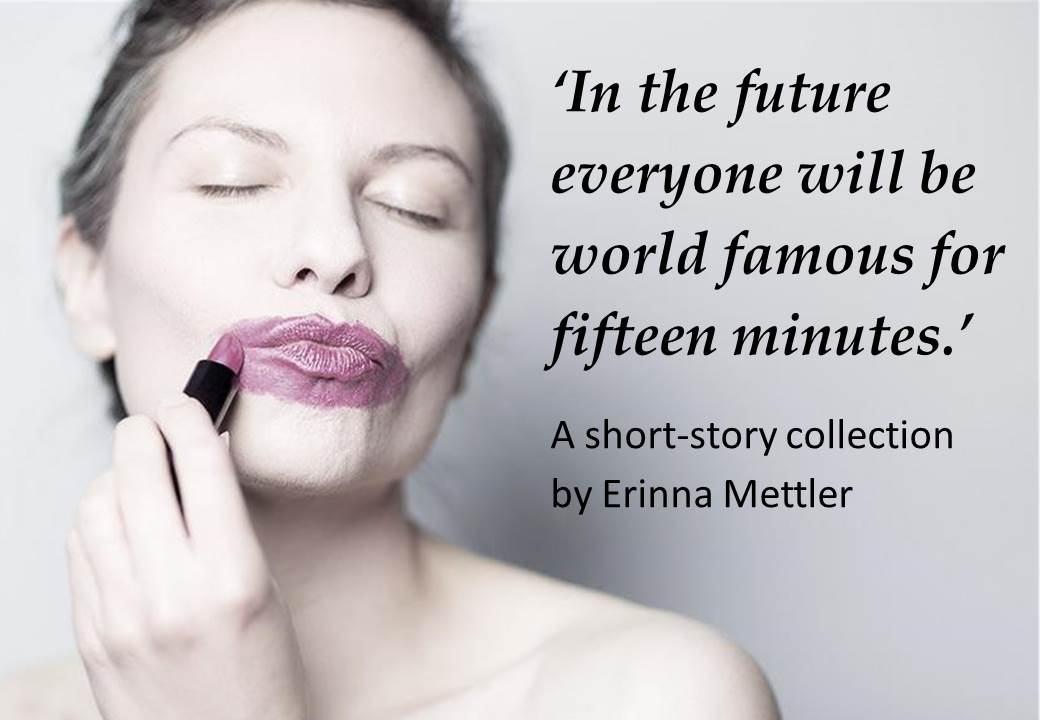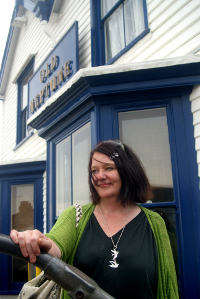
photo © Ed Yourdon, 2014
by Erinna Mettler
Let’s set the scene: you have written your short story collection, toiled away for years. Some of the stories have been performed at spoken word events, some have been shortlisted in competitions, some have won competitions, and some have been published in journals and anthologies. With all this evidence to the quality of the stories in your collection, you would think you could get an agent and a publisher without much effort. You’d be wrong.
Sadly, many agents don’t take on short story collections because publishers won’t read them. Though there are, of course, a handful of agents and independent publishers who are willing to look at short story collections from new authors, in the UK there seems to be some contempt for the form. From what I’ve seen, to get a single author collection published by a mainstream publisher you have to either be Hilary Mantel or have won the BBC National Short Story Award, even then you may need a novel waiting in the wings in order to reach a publisher’s reading list, and that may well need to be published before the collection.
If you do manage to get your collection into an independent publisher’s slush pile, a lack of funds and a huge number of submissions mean that the odds are against you from the start. This is all hard to take if you are a dedicated short story writer rather than a novelist.
An accomplished short story writer I know recently completed a collection of stories, many of which had either won or been shortlisted in prestigious competitions. The remainder had been published in journals; their quality is undisputed. She already had an agent – an established, savvy professional at a big company, who understood the industry perfectly – and he loved her work and was confident in finding a publisher. He sent it out to about fifteen of the big publishers. It got ‘very, very close’ with quite a few, and made it to a couple of acquisitions meetings, where it was turned down by the marketing people. The writer said:
I got a load of incredibly valuable feedback and comments from editors (which was extremely, weirdly, hard to read, because it seemed as if they loved my work and yet were not going to publish it – hard to swallow).
The agent then sent the collection out to a series of independent publishers – but the outcome was the same: When she writes a novel we will be very interested, but short story collections are too hard to convince our marketing people about. The whole experience was extremely frustrating for the writer because the quality of her work wasn’t in dispute, just the form she had chosen. Similar stories have been told to me so many times, by friends and colleagues, that I didn’t even try to find an agent for my current collection. It does seem bizarre to me that excellent short story collections are rejected in favour of inferior works simply because a publisher’s marketing department doesn’t know how to sell them. Isn’t this an admission that they can only do their job if presented with a Xerox of Gone Girl? No matter, this is the way it is, so we will have to find a way around it.
Presenting a short story collection as a novel.
Several famous authors have used this trick – Elizabeth Strout with Olive Kitteridge, Anne Tyler with A Spool of Blue Thread, and David Mitchell with Cloud Atlas, to name a few. I tried it with my first book, Starlings, but, in truth, no one was convinced and all the main agents and publishers turned it down because they didn’t take on short stories. Instead, it was published by a tiny independent called Revenge Ink, who look for books that are ‘experimental, extreme, each one radically distinct from the other’. The main problem with this publishing option is that the stories usually need some kind of cohesion to form a linked collection, and this isn’t always the case. So, what else can you do?
Self-publishing.
Author Nick Gerrard writes edgy, modern short stories; you won’t see his name on The Bridport Prize shortlist. Nick self-published his collection, Graffiti Stories, earlier this year and it has already attracted this stunning review: ‘Mr. Gerrard writes with a keen hand guided by his ancestors: Dylan Thomas, Colm Tóibín, and Frank O’Connor.’ Nick has previously self-published books of travel writing and poetry. He told me that a couple of independent publishers had been interested in taking Graffiti Stories on but wanted him to do most, if not all, of the marketing and were offering around just fifteen percent of the royalties. That’s peanuts to a self-published author: with Amazon you get around seventy percent. Instead, Nick spent his money on ‘a good editor’ and still does all the marketing and promotion himself.
 There Is Another Way.
There Is Another Way.
Self-publishing is not for everyone. You may get autonomy, but you don’t get much support from anyone else and it’s a crowded marketplace. However, there are a few companies out there who are taking a different approach to mainstream market-led publishing, offering authors with difficult to place books a chance at publication, as well as the editorial and marketing back up they need to ensure a wider readership. In February, I signed with Unbound Publishing to crowd-fund my collection, In The Future Everyone Will Be World Famous For Fifteen Minutes.
Unbound are an innovative crowd-funder with a great success rate and an impressive list of authors. This includes Paul Kingsnorth, who crowd-funded his debut novel The Wake, which was longlisted for the 2014 Man Booker Prize and the 2015 Folio Prize, and was described as ‘a literary triumph’ by a reviewer for the Guardian. Unbound, in their promotional video, declare:
Authors get to write the books they want to write and you get to read real books that, in a crowded, celebrity obsessed market place might never see the light of day.
Their submission process is the same as a traditional publisher: the guidelines say to allow three months response time, though in my case it was only a month. That’s the thing with crowd-funding, everything works at double speed. I got an email telling me my book had been accepted and asking me to upload a synopsis, an extract, a cover image, a biography and a promotional video within twenty-four hours! I managed everything but the video, which took a little longer yet was fairly easy to do – all you need is a smart phone and some helpers (my husband did the filming and my son held up the script). Some people take it further and make semi-professional videos.
Then it’s a matter of encouraging pledgers to fund your book. I knew it wouldn’t be easy, but I didn’t think it would be so hard. Through my work as Director of Rattle Tales and The Brighton Prize, I have a lot of Twitter followers and access to a vast mailing list, but each pledge is hard earned. I have printed flyers and posted relentlessly on social media, and I publicly thank each and every pledger for their generosity. For the project to go ahead, I need 180 pledges in one month, so on I go with the promotion.
As with everything, there are a couple of roadblocks to crowd-funding a book and you need to know how to negotiate them before you set off. The main problems surround actually getting people to pledge. A lot of people are still unsure what crowd-funding is and how they can help. People will ‘like’ your Facebook page and think that’s all they have to do, unaware that they need to visit another site and pledge their support. They also need constant reminders of how to pledge, especially those who say they will and then don’t.
I’m not sure if it’s an English constraint, or just a human one, but it is very difficult to ask for money. A lot of people think of it as begging rather than offering someone a chance to participate in a unique project. A fellow writer recommended Amanda Palmer’s TED Talk on The Art Of Asking. Palmer, who has raised over a million dollars crowd-funding her music, talks about reassessing the connection between the artist and the public. Drawing on her pre-fame experience as a living street statue, she says that a special connection is made by looking people in the eye and asking them to help you create art, that the space between the two is diminished. She talks about the art of asking, of learning to ask without shame. For the artist, the asking isn’t about the obvious monetary exchange (in my case, pledge = book) it is more about a way of enabling art that wouldn’t otherwise be created.
If you are a short story writer, rather than a novelist, don’t despair, there are publishing options out there. But, whichever one you choose, you will quickly learn that the easy bit was writing the stories.
~
Erinna’s new short story collection on the theme of fame, In The Future Everyone Will Be World Famous For Fifteen Minutes, is currently crowd-funding. To pledge go to unbound.co.uk/books/fifteen-minutes
~
 Erinna Mettler is a Brighton-based writer. Her first novel, Starlings, was published in 2011 and described by one critic as doing for Brighton what The Wire did for Baltimore. She is a founder and co-director of The Brighton Prize for short fiction and of the spoken word group Rattle Tales. Her stories have been published internationally and shortlisted for The Bristol Prize, The Fish Prize and The Writers & Artists Yearbook Award. Her career highlight was having a short story read by a Game of Thrones actor at Latitude Festival.
Erinna Mettler is a Brighton-based writer. Her first novel, Starlings, was published in 2011 and described by one critic as doing for Brighton what The Wire did for Baltimore. She is a founder and co-director of The Brighton Prize for short fiction and of the spoken word group Rattle Tales. Her stories have been published internationally and shortlisted for The Bristol Prize, The Fish Prize and The Writers & Artists Yearbook Award. Her career highlight was having a short story read by a Game of Thrones actor at Latitude Festival.


I enjoyed this, Erinna. Hope you get the pledges you need. It’s a hard world for short story writers to get published.